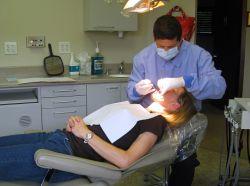Advertisement
Grinding Recession Fractures Careers, Teeth
Resume
On the surface, it is peaceful at Cathy Mazzuchi’s home on Penni Lane. Inside, her two teenagers are reading. Outside, beneath the blue suburban skies, the birds are singing. But underneath all this, there is the stress. Those kids, Mazzuchi knows they’re going to mean college tuition in just a couple of years.
"What savings we had or investments we had just bottomed out," Mazzuchi says. "Not only do you have your expected education costs, but how are you going to save for your retirement when the stock market is such a mess and your investments are such a mess? It’s a little bit hopeless."
Mazzuchi does not have much hope of making more money anytime soon. She is a substitute teacher and schools are cutting back. Meanwhile, her husband is in sales, not exactly the best thing to be in when consumer spending is down.
"So he has the stress of being the solitary breadwinner at this time," Mazzuchi says.
She says it is enough to make him clench his teeth. "I know, for him, he has bite guards because he does grinding and clenching during the night," she says. "He’s actually bitten through those that are made from Teflon. Just so much stress. And that’s where he takes it out, is on his teeth."
And so does she.
Mazzuchi went to see periodontist David Samuels recently. Her clenching and forcing her teeth sideways against each other at night had exposed the root of a tooth. Samuels has been seeing more cases of grinding lately.
"It’s literally like taking a forceps over many years and extracting a tooth," he says. "That’s how much pressure that some people put on their teeth at night."
Sustained pressure teeth are not designed to take. At first, patients may only wake up to headaches and muscle pain. Over time, the teeth wear down and decay more easily. Eventually the gums and jaw bones wear away and the teeth are torn out.
Now, patients who subconsciously take out stress on their teeth at night is nothing new. But the recession is. And Samuels can practically see the impact of the economy in his patients' X-rays.
"On these films right here that we’re looking at, this area right here represents the top of the tooth – a fracture of the top of the tooth from clenching and grinding," Samuels says. "You also see flattened surfaces on tops of the teeth. And then if you look down here below, you’ll see the bone loss associated with clenching and grinding. So even on the X-rays, you can see evidence, if you will, of increased stress in someone’s life. And we do see more of that now than we used to."
About twice as much. Samuels is also the head of the state dental association. A survey of its 5,000 members reveals business from stress-related tooth injuries has generally doubled.
The most common remedy for teeth grinding is a preventative bite guard. Generic ones you can buy a drugstore cost about $25. Samuels says they’re better than nothing. But he recommends custom-fit ones.
"This is a night guard that’s about to be delivered," he says. "We use a very specialized lab in New Jersey for these."
This specially-made bite guard costs between $500 and $600. Even if you have dental insurance, bite guards are often not covered. So Samuels says the problem is that just when people are stressing out over finances and need these, they can’t afford them.
It is something dentist Robert Emami hears all the time. "Dr. Emami, I have to hold off on this," he says he's told. "I’m a little bit worried about my job."
Emami has practices in Randolph and Dedham, where a growing number of his patients have lost their jobs and begun grinding their teeth. "My best advice to patients is this: I understand that you might have lost your insurance. I understand that your budget you have to keep an eye on," he says. "But preventative care is a lot cheaper and a lot less invasive than repairs."
Sound advice that has gotten harder to follow as the recession grinds along.
This program aired on July 6, 2009.
